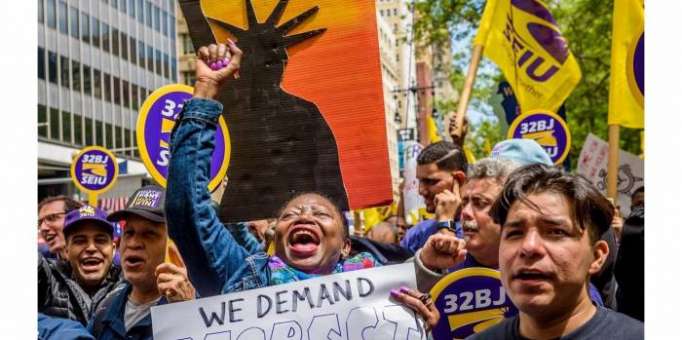You’ve probably heard this before: Markets are soaring, and wealth is growing, but most of the gains are going to those at the top. Rapid technological advances are transforming daily life and creating new industries, but are also fueling anxiety about lost jobs and occupations. People are increasingly angry at giant corporations’ perceived monopolistic power. Cities are thriving as magnets for the wealthy and ambitious, but rural residents often feel left behind. Anti-immigrant sentiment has become intense, and sometimes violent. Women are challenging male power in viral protests. Political corruption is fueling widespread fury, with many convinced that moneyed interests have captured their democratic institutions. Trust in political parties is at new lows. And amid all the dismay and dysfunction, some of the new plutocrats have stepped up as philanthropists to underwrite social reform.
Yes, it all sounds like Trump-era America. But these conditions also prevailed more than a century ago, during the Progressive Era of the early 1900s.
Disgusted by the massive inequalities of the Gilded Age, the first Progressives sought comprehensive reform. Changes to the US Constitution adopted during this period include the introduction of the federal income tax with the Sixteenth Amendment, direct election of senators with the Seventeenth Amendment, the prohibition of alcohol with the Eighteenth Amendment (some ideas were really bad), and women’s suffrage with the Nineteenth Amendment.
Progressives wanted citizens to rule more directly, overturning a powerful and often corrupt political-industrial complex that had gradually usurped their rights. They championed recall votes as a way to remove leaders and officials serving vested interests rather than citizens. They created direct primary elections, empowering citizens to choose which candidates to nominate, thereby undermining the power of party “machines.” And in 1902, Progressives in Oregon won overwhelmingly approval of a ballot measure creating the initiative and referendum processes. Since then, most states have adopted these fundamental democratic processes, enabling citizens to introduce or approve proposed laws or amendments to their state constitutions.
As James Fishkin of Stanford has written, “deliberative democracy” has a long history, extending back to the original democracy in Greece in the fifth century, BC. In this model, informed and engaged citizens directly set the agenda for their representatives (though not with the Greeks’ narrowly circumscribed definition of who is a citizen).
Today, a new generation of progressive federalists are leveraging the initiative process to give citizens power over policy. The specifics of how citizens can put measures to a popular vote or require the legislature to address them vary substantially from place to place, but 26 states and hundreds of cities, accounting for more than 70% of the US population, have initiatives in their governance tool box.
Sometimes initiatives have created ongoing challenges for elected leaders, as has been the case with California’s Proposition 13, which capped state property taxes when it passed in 1978. And sometimes they have addressed frivolous issues, as was the case with a failed attempt in 2016 to require condoms in pornography. But they have also been fundamental to major reforms that have reshaped governance, especially in California. Citizen-based redistricting, open primaries, changes to term limits, majority-vote budgets, a rainy-day fund, and legislative transparency have all been the direct result of civic-minded leaders deploying the initiative process for the public good.
California is not alone. In the last several years, the initiative process has led to redistricting in Arizona, and ranked-choice voting in Maine. In many other states, voters have approved public financing of elections, the adoption and preservation of Medicaid expansion, and marijuana legalization. Voter initiatives in several cities have also resulted in significant increases in the minimum wage and other worker benefits. On average, 150-200 initiative measures are on the ballot in states across the US every election year.
Now, leading reformers are seeking to launch a movement to use initiatives in a more coordinated national campaign. The lessons learned from the minimum-wage campaigns show the promise of such an effort. Beginning in mid-2016 in California and Washington, DC, ballot measures to raise minimum wages passed with overwhelming support. In November 2016, even as Donald Trump was winning the presidency, minimum-wage increases passed in Arizona, Colorado, Maine, and Washington by margins of 10-18 percentage points. Total spending of $25 million (less than was spent on a special election for the House of Representatives in Georgia) brought 8.1 million workers in six states a pay raise of over $2.5 billion (growing to more than $20 billion when fully implemented).
In November of this year, Maine shocked observers again, when voters there approved Medicaid expansion by 59-41%, overturning five vetoes by Governor Paul LePage of legislative efforts in favor of the expansion. For a total campaign cost of $1.7 million, 89,000 Maine citizens now stand to gain health insurance.
Watch this space. In 2018, initiatives for democratic reforms – including redistricting, stricter ethics standards, and broader voting rights – are in the process of being qualified across the country. These measures build on a legacy of reforms that have spread across the country over the last few election cycles.
The original Progressives would be proud. It may have taken more than a century, but their effort to ensure that democracy actually works, by putting power in the hands of citizens through the initiative process, created what may be the most powerful reform tool in US history. Let’s hope so.
Laura Tyson, a former chair of the US President's Council of Economic Advisers, is a professor at the Haas School of Business at the University of California, Berkeley, and a senior adviser at the Rock Creek Group.
Lenny Mendonca, Chairman of New America, is Senior Partner Emeritus at McKinsey & Company.
Read original article on project-syndicate.org.
More about: democracy
















































